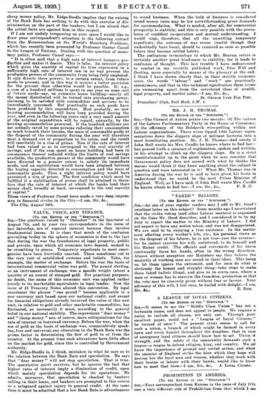VALUE, PRICE, AND FINANCE.
[To. Tan Emelt or THE " fintersroa."] SIR,—The questions raised by "Onlooker " in the Spectator of August 7th, and by your two correspondents in the issue of last Saturday, are of especial interest because they involve fundamental issues. It is clear that much of the confusion prevailing to-day in the sphere of economies is due to the fact that during the war the foundations of legal property, public and private, upon which all economic laws depend, seemed to be crumbling to pieces. Temporary expedients to meet emer- gencies have been hurriedly enacted.. These sometimes cut to the very root of established customs and beliefs. Take, for example, the matter of exchange. Before the war the basis of International commercial value was gold. The pound sterling, as an instrument of exchange, was a specific weight (about a quarter of an ounce) of stamped gold. For practical purposes, no doubt, the name of this economic unit was applied rather loosely to its marketable equivalents in legal tender. Now the issue of £1 Treasury Notes altered this convention. By legal enactment the phrase " one pound " became applicable to a new currency unit based upon our national credit, and except for financial obligations already incurred the value of this new unit, in relation to gold and other marketable commodities, has fluctuated, as necessarily it must, according to the general belief in our national stability. The expressions " dear money " and " cheap money " are, of course, mere colloquialisms for the rate of interest on borrowed currency. Before the war, when the use of gold as the basis of exchange was, comparatively speak- ing, free and universal, any alteration in the Bank Bate was the prime factor in determining the flow of gold to or from the country, At the present time such alterations have little effect on the market for gold, since this is controlled by Government authority.
Mr. Ridge-Beedle is, I think, mistaken in what he says as to the relation between the Bank Rate and speculation. He says that "dear money" will not stop speculation. That is true. The speculative spirit survives, but he ignores the fact that higher rates of interest imply a diminution of credit, upon which mainly speculation depends for its operations. He admits, moreover, that speculation is checked by bankers calling in their loans, and bankers are prompted to this course as a safeguard against injury to general credit. At the same time it must be admitted that a low Bank Rate is advantageous
to sound business. When the bulk of business is considered sound money rates may be low notwithstanding great demands for apcommodaticm. What is needed, after all, for commercial prosperity is stability, and-this is only possible with the preva- lence of confident co-operation and mutual understanding. I would urge, therefore, that all the unsettling' temporary- expedients, the outcome of war stress (useful though they undoubtedly have been), should be removed as soon as possible before they become settled habits.
The ambiguous terminology to which Mr. Beavan refers is certainly another great hindrance to stability, for it leads to confusion of thought. This last trouble I have endeavoured to combat in my recently published work, Free Will and Destiny, more especially by means of the glossary at the end. I think 1 have shown clearly that, in their strictly economic sense, the words " labour " and " work " are practically synonymous, and that in this technical signification these terms are unmeaning apart from the correlated ideas of wealth, legal property, and market value.—I am, Sir, &c.,


































 Previous page
Previous page